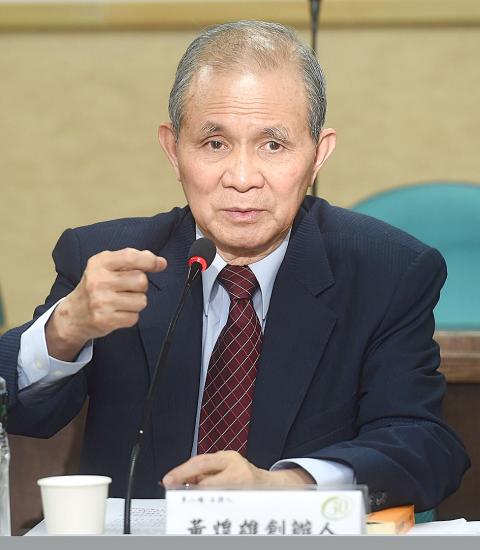While removing authoritarian symbols, the transitional justice promotion committee should aim to avoid exacerbating conflicts between opposing sides, committee chairman nominee Huang Huang-hsiung (黃煌雄) wrote in materials that were on Friday submitted to the legislature by the Executive Yuan for its review of the committee’s nominations.
Taiwanese hold divergent views on authoritarian symbols, Huang said, adding that if the committee could allow society to form a consensus on their removal, it would have succeeded.
When determining the truth and who holds responsibility, the committee should build trust, push for dialogue and allow people to decide which symbols are authoritarian and how to handle them, Huang said.

Photo: Chien Jung-fong, Taipei Times
People often reduce the purpose of the committee to changing road names and the faces on currency, full-time committee member nominee and former Taiwan Association for Truth and Reconciliation chief executive Yeh Hung-ling (葉虹靈) wrote.
The handling of authoritarian symbols should not be the committee’s primary task — it should first uncover historical truths, then gradually describe the different types of authoritarian symbols and facilitate collective reflection to build a foundation for their future handling, she wrote.
Meanwhile, full-time nominee and Academia Sinica ethnologist Peng Jen-yu (彭仁郁) wrote that the committee should work to better understand diverse and conflicting histories so that the symbols could be handled appropriately under a high level of public consensus.
However, full-time nominee and Taiwanese literature academic Yang Tsui (楊翠) said that bronze statues of former presidents Chiang Kai-shek (蔣介石) and Chiang Ching-kuo (蔣經國) should be removed.
Roads and public buildings named after authoritarian rulers should be renamed to show that the people deny the legitimacy of authoritarian rule, part-time nominee and Judicial Reform Foundation member Greg Yo (尤伯祥) wrote.
Nearly all of the items that were left by the German National Socialist Workers’ Party (Nazi party) have been removed, committee vice chairman nominee and Mainland Affairs Council Deputy Minister Chang Tien-chin (張天欽) wrote.
Handling the National Chiang Kai-shek Memorial Hall would be the best way to begin promoting transitional justice, part-time nominee and Academia Sinica Institute of Taiwan History director Hsu Hsueh-chi (許雪姬) wrote, with part-time nominee and National Taiwan University history professor Hua Yih-fen (花亦芬) agreeing that its handling should be the committee’s primary task.
The statue inside the hall could be moved to Taoyuan’s Cihu Memorial Sculpture Garden for preservation, but the hall itself should remain to help Taiwanese understand how the authoritarian ruler was introduced and the effect authoritarianism had on Taiwan before transitional justice, she wrote, adding that it could be turned into an art library or human rights museum.

Taiwanese can file complaints with the Tourism Administration to report travel agencies if their activities caused termination of a person’s citizenship, Mainland Affairs Council Minister Chiu Chui-cheng (邱垂正) said yesterday, after a podcaster highlighted a case in which a person’s citizenship was canceled for receiving a single-use Chinese passport to enter Russia. The council is aware of incidents in which people who signed up through Chinese travel agencies for tours of Russia were told they could obtain Russian visas and fast-track border clearance, Chiu told reporters on the sidelines of an event in Taipei. However, the travel agencies actually applied

Japanese footwear brand Onitsuka Tiger today issued a public apology and said it has suspended an employee amid allegations that the staff member discriminated against a Vietnamese customer at its Taipei 101 store. Posting on the social media platform Threads yesterday, a user said that an employee at the store said that “those shoes are very expensive” when her friend, who is a migrant worker from Vietnam, asked for assistance. The employee then ignored her until she asked again, to which she replied: "We don't have a size 37." The post had amassed nearly 26,000 likes and 916 comments as of this

New measures aimed at making Taiwan more attractive to foreign professionals came into effect this month, the National Development Council said yesterday. Among the changes, international students at Taiwanese universities would be able to work in Taiwan without a work permit in the two years after they graduate, explainer materials provided by the council said. In addition, foreign nationals who graduated from one of the world’s top 200 universities within the past five years can also apply for a two-year open work permit. Previously, those graduates would have needed to apply for a work permit using point-based criteria or have a Taiwanese company

The Shilin District Prosecutors’ Office yesterday indicted two Taiwanese and issued a wanted notice for Pete Liu (劉作虎), founder of Shenzhen-based smartphone manufacturer OnePlus Technology Co (萬普拉斯科技), for allegedly contravening the Act Governing Relations Between the People of the Taiwan Area and the Mainland Area (臺灣地區與大陸地區人民關係條例) by poaching 70 engineers in Taiwan. Liu allegedly traveled to Taiwan at the end of 2014 and met with a Taiwanese man surnamed Lin (林) to discuss establishing a mobile software research and development (R&D) team in Taiwan, prosecutors said. Without approval from the government, Lin, following Liu’s instructions, recruited more than 70 software